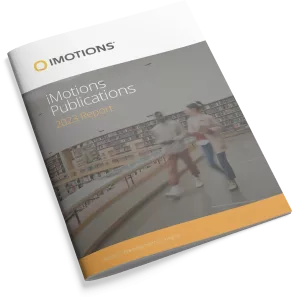-
Exploring Pie Chart Visual Properties and Design Elements: EyeTracking Approach
This research explores the impact of pie chart data representation on users by focusing on users’ performance, cognitive effort, and visual attention while employing novel eye tracking technology. This research focused on two questions centered around a difference in users’ visual attention, performance, and cognitive effort between pie chart visual properties and design variations. Two […]
-
Gaze Behaviors of Neurosurgeon in Performing Gross Movements under Microscope
Frequent intermittent bleeding control and suction are often necessary during micro-neurosurgical procedures. We compared the visual searching strategy that guides these types of gross hand movements between expert surgeons and neurosurgical residents. A total of 70 trials of a microsurgical task consisting of moving a cotton ball with bipolar forceps and a suction instrument under […]
-
Face Value: Remote facial expression analysis adds predictive power to perceived effectiveness for selecting anti-tobacco PSAs
Perceived effectiveness (PE) is a validated tool for predicting the potential impact of anti-tobacco public service announcements (PSAs). We set out to evaluate the added predictive value of facial expression analysis when combined with PE in a remote (online) survey. Each of 302 tobacco users watched 3 PSAs and allowed transmission of webcam videos from […]
-
Investigating the relationship between facial mimicry and empathy
Facial expressions play a key role in interpersonal communication when it comes to negotiating our emotions and intentions, as well as interpreting those of others. Research has shown that we can connect to other people better when we exhibit signs of empathy and facial mimicry. However, the relationship between empathy and facial mimicry is still […]
-
Work-in-progress-Gamifying the process of Learning Sign Language in VR
This study recognizes the need for providing a tool to facilitate learning British Sign Language (BSL). Virtual reality coupled with gamification holds exciting prospects to accommodate this need. This paper presents a work-in-progress study that focuses on evaluating the impact of combining scaffolded instruction with gamification to design a 3D interactive game to support learning […]
-
Visual Tailoring and Skin Cancer Prevention: Comparing Personalized, Stock, and Non-Ultraviolet Images
Past research has demonstrated that ultraviolet (UV) photos – which reveal skin damage as dark patches – can increase preventive behaviors. Emerging camera technology facilitates personalized UV photos for interventions, yet little is known about how personalized photos compare to other visuals and what cognitive or affective mechanism explains their persuasive impact. To engage this […]
-
Neuro-Participatory Urbanism: Sensing Sentiments and Tracking Perceptions With Machine Learning.
Public places are enablers for diverse and desirable encounters within the city, as evident in the growing efforts by governments in their national policy-making and by academia in their research activities that aim to create mixed-use neighbourhoods capable of supporting such socialization. Novel architectural and urban approaches have thus evolved and developed to engage its […]
-
Understanding Drivers’ Physiological Responses in Different Road Conditions
Although the driver’s emotion has been studied in the different driving environments (such as city and highway), understanding what eye metrics and facial expressions correspond to specific emotion and behavior based on subjective and biosensor data to study emotion in depth is not well researched in previous studies. Using an eye-integrated human-in-the-loop (HTIL) simulation experiment, […]
-
Understanding Drivers’ Physiological Responses in Different Road Conditions
Although the driver’s emotion has been studied in the different driving environments (such as city and highway), understanding what eye metrics and facial expressions correspond to specific emotion and behavior based on subjective and biosensor data to study emotion in depth is not well researched in previous studies. Using an eye-integrated human-in-the-loop (HTIL) simulation experiment, […]
-
How are Drivers’ Stress Levels and Emotions Associated with the Driving Context? A Naturalistic Study
Understanding and mitigating drivers’ negative emotions, stress levels, and anxiety is of high importance for decreasing accident rates, enhancing road safety, and providing a healthy lifestyle to the community of drivers. While detecting drivers’ stress and negative emotions can significantly help with this goal, understanding what might be associated with increases in drivers’ negative emotions […]
Research Report 2024
In-depth look at the scientific landscape as powered by iMotions software, showcasing groundbreaking research and the impact of our tools in various scientific and industrial fields.
iMotions Science Resources
Looking for white papers, validation reports or research show casing iMotions Multimodal capabilities?
Share Your Research

850+ universities worldwide with an iMotions human behavior lab
73 of the top 100 highest ranked universities
710+ published research papers using iMotions
iMotions is used for some of the most interesting human behavior research studies carried out by top researchers around the world. Contact us to have your publication featured here.
The authors of these publications have used iMotions as a software tool within their research.
“Software should be cited on the same basis as any other research product such as a paper or a book; that is, authors should cite the appropriate set of software products just as they cite the appropriate set of papers” (Katz et al., 2020).
We therefore encourage you to cite the use of iMotions where appropriate.
How to cite iMotions
APA
iMotions (10), iMotions A/S, Copenhagen, Denmark, (2024).
Note: adjust the version and year where relevant.
5 Most Popular Blogs
Learn How to Conduct Human Behavior Research with iMotions
Publications
Read publications made possible with iMotions
Blog
Get inspired and learn more from our expert content writers
Newsletter
A monthly close up of latest product and research news




